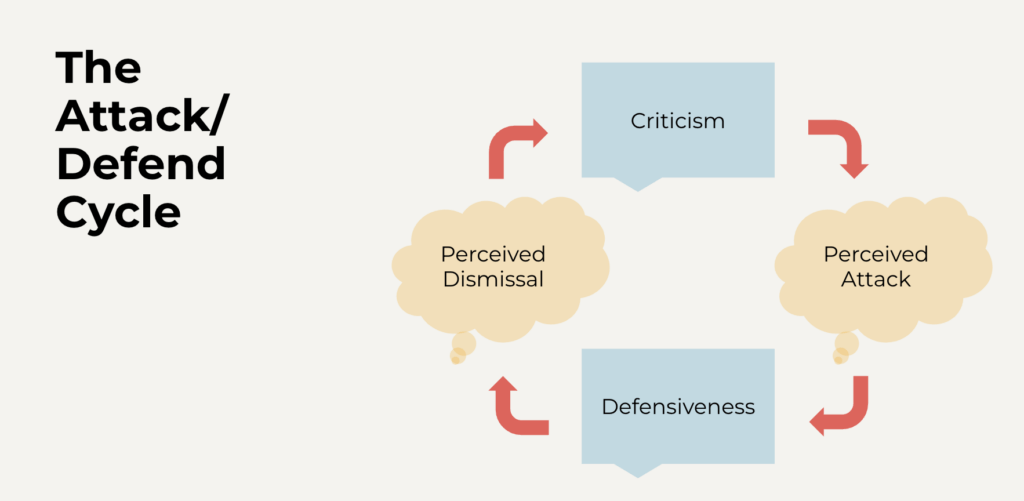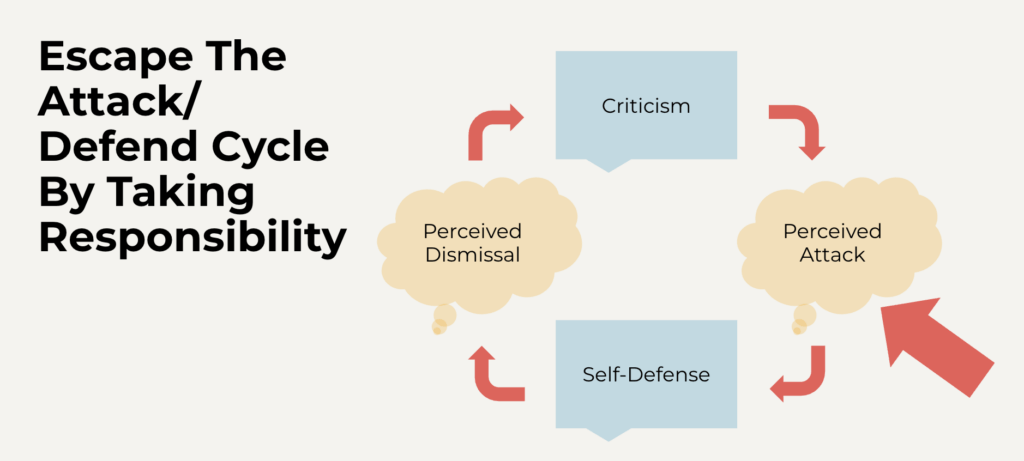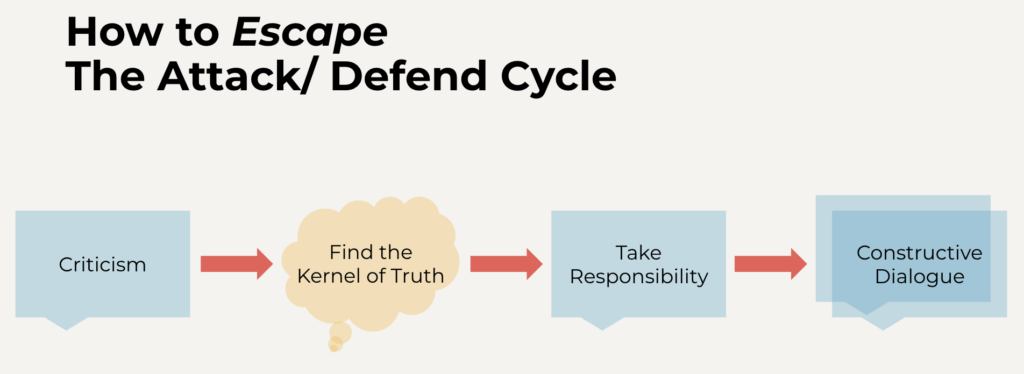How Can I Stop Being Defensive?
Defensiveness is one of the most common problems in all relationships, especially romantic ones.
We know from Dr John Gottman’s research that defensiveness and criticism are two of the “4 Horsemen of the Apocalypse”, which predict divorce and relationship unhappiness.
Criticism and defensiveness go hand in hand. They travel together like an old married couple who are bickering twenty-four-seven. The single most common communication pattern in relationships is the attack/defend cycle.
One person is trying to say something important, but it lands as criticism instead of constructive, loving feedback, which then causes the other person to feel attacked and blamed. We tend to become defensive when we feel attacked. This causes the other person to feel unheard and intensify the original point (but the pattern escalates when each person becomes increasingly critical and defensive).
It’s possible, and not as difficult as you might think, to prevent the attack/defend cycle or get out of it once you’re in it. Here is a video that details the pattern.
The remainder of this article will answer one of the most common questions I get in my couples therapy office: “How can I stop being defensive in my relationship?”
Why Am I Defensive With My Partner?
If you want to learn how to stop being defensive in your marriage or relationship, you are probably feeling attacked, blamed, or criticized.
Most people don’t intend to be defensive with their partners. It usually starts as an attempt to comfort or soothe. You probably didn’t intend to let your partner down. It seems like once you explain this, the problem will quickly be resolved and your partner will hopefully feel better and see that you didn’t do anything wrong.
But unfortunately, this intention to clarify your innocence can backfire and your partner will likely feel dismissed, minimized or unheard. Even worse, they might accuse you of not caring how you feel, which is not true at all (and will probably make you feel even more defensive).
This is how an attempt to express something important quickly escalates into a classic attack/defend communication pattern.
Examples of Defensiveness in Relationships
I wouldn’t have been late if you had texted me that you were on your way.
It’s not my fault that the dog is badly behaved.
You were the one who thought it was a good idea to come here in the first place.
I didn’t say it to be mean, you always take everything as a criticism (defensiveness with a counter-attack)
Let me just explain why I did what I did, then you’ll understand.
How to Stop Being Defensive in Your Relationship
The first step to responding to criticism non-defensively is understanding the bigger picture.
Remember that your partner has something important that they want you to understand. Unless they woke up in the morning with a vindictive plan to hurt your feelings, they are trying to share their feelings with you. It might feel like an attack or blame because they may be raising the topic in an unskilled manner.
Try to remind yourself that your partner’s feelings have value and that you want to be the kind of person who is open to receiving constructive feedback. While you may feel like you did nothing wrong, I recommend hearing them out anyway. Slow down before jumping in to prove your innocence if you want to have a constructive dialogue instead of a fight.
All couples have disagreements, differences of opinion, and conflict. This is a good thing. Talking about challenging topics allows us to learn, grow and have deeper and healthier relationships.
It’s Your Job Not to Be Defensive, Even When You’re Being Attacked or Criticized
It might not seem fair that you have to change your behavior when you’re the one being attacked. Still, the reality is that defensiveness is just as damaging to a healthy relationship as criticism. In fact, we know from the Gottman’s research that both criticism and defensiveness lead to divorce.
The good news is that you can learn how to stop being defensive.
By the way, if you’re sitting here thinking, “I’m not defensive,” you might be right, in which case this article might not apply to you, but there’s also a possibility that you’re having a defensive thought 🙂
It’s not your fault; you can blame your ancestors. Self-defense is a form of anti-predator adaptation, and it determines whether or not a species survives the process of natural selection. It’s an extraordinary thing.

Can you see a caterpillar camouflaged on the leaf? Look closely!
Self-defense is a mechanism for survival, yet communication experts advise against it. Why should you stop being defensive and suppress an evolutionary instinct?
Because no one is trying to kill you!
When we feel attacked (not only physically, but also verbally or emotionally) the human brain sends danger signals throughout our bodies. Thousands of years of natural selection have reinforced self-defense (the apes that didn’t defend themselves died; therefore, our genetic makeup comes from those who did defend themselves).
Feeling attacked, blamed, criticised or unfairly picked on are all experiences that will trigger the evolutionary defense mechanism that we are trying to avoid.
Defensiveness increases the chance of individual survival but dramatically decreases the chance of relationship survival.
All negative communication is not created equally.
The four horsemen are Criticism, Defensiveness, Contempt, and Stonewalling. He and his wife, Dr. John and Julie Gottman created a method of couples therapy in which the therapist teaches the couple the “antidotes” to these four horsemen, and today we will discuss the antidote to defensiveness.
Of the four horsemen, Defensiveness is one of the most challenging communication patterns to recognize as destructive because it often looks benign. By recognizing the damage and learning how to stop being defensive, you increase the chances of remaining happy.
What is Defensiveness, and how does it happen?
Similar to a caterpillar’s camouflage, humans tend to verbally self-defend when feeling criticized. The pattern progresses like this:
1.Feedback is given (usually with positive intention) -> “You know I love you, babe, but this lasagna tastes horrible!”
2. Feedback feels critical and triggers self-defense ->”I was able to put this together in the 15 minutes between a conference call with my boss and picking Joey up from soccer, it’s pretty amazing I was even able to get any dinner on the table. Did you know most families eat fast food every single night!?!”
3. Response triggers counter-defense -> “Sheesh, why do you have to be so sensitive? All I’m saying is you left the lasagna in the oven too long! Besides, where did you get that statistic, all the families I know made a point to sit down and have dinner together.
4. Both parties feel unjustly accused and are working to prove their innocence. (I’m just a leaf, sitting here minding my own business…)
This diagram depicts the attack/defend cycle. As a couple repeats this cycle the argument escalates with each round, increasing the risk of saying something or doing something you regret.

How To Stop Being Defensive with John Gottman’s Antidote to Defensiveness
There will always be times when someone gives you feedback in a critical manner. By following the five steps below, you can avoid a defensive response and decrease the likelihood of an escalation into an argument.
Take accountability.
1. Listen to the truth within the criticism.
It’s helpful to remember that no one is perfect and neither partner in a relationship is completely innocent. Therefore, when your partner criticizes you, there is something important he or she is trying to tell you. Even if you feel like your personality is being attacked, look for the kernel of truth within your partner’s statement.
You know you burnt the lasagna, and you want your partner to be more understanding of how hard it is to get a home-made dinner on the table in the midst of a busy life. Nonetheless, it is true that you lost track of time.
2. Reach beyond the negativity and attempt to give the benefit of the doubt
While I really didn’t need to hear how bad the lasagna tasted, perhaps my partner was really looking forward to a wonderful meal with me and this might simply be about the burnt lasagna, not about me.
3. Validate your partner’s perception (even if you disagree)
Everyone wants to feel heard. Think of being a child. How did it make you feel when adults told you to “just get over it” or that your feelings were wrong? When people feel dismissed, they are less likely to open up the next time. Instead of feeling close to their partners, they begin to feel estranged. This is why defensiveness can be so damaging to relationships.
4. Tell your partner what you agree with.
After going through this silent redirection of your thinking, verbally take responsibility for your contribution to the problem.
“You’re absolutely right about ____.”
This serves multiple purposes. By repeating something your partner said, you let them know you were listening. And by agreeing with them on at least part of their complaint, you validate their feelings without judgment.
You’re absolutely right, this lasagna is horrible!!!
5. Bring up your difference of opinion last.
We are not suggesting that you take the blame for everything that is brough up, it is simply a matter of sequence.
After you’ve accepted accountability for your role in what happened, your partner will likely be more open to hearing and validating your perception of events. Waiting to go last also gives you the opportunity to cool down some and avoid that knee-jerk, defensive reaction.
“It’s really hard to get a nice dinner on the table every night, we’ll need to figure out a better way to manage these busy evenings.”


I hope this article helped you answer your original question of “How can I stop being defensive in my romantic relationship or marriage?” It will take time and practice and compassion for both yourself and your partner as you try to change your communication into a much more productive way of talking.
As you are improving your communication skills, remember that empathy is the super-glue that holds a relationship together. While decreasing defensiveness and criticism will help you manage conflict better, improving empathy will help you feel closer and better understood. These skills used together are the recipe for long-term happiness and a healthy relationship.
Here Is a Free Course For You
I am pleased to announce that I have created a free empathy course for anyone who wants to improve their ability to manage stress and increase intimacy. Click the link below to learn more:
Empathy Made Easy: A Free Mini Course for Couples.
Would You Rather Do a Bit More Reading First?
Learn how to avoid a fight in this article which details the other half of the attack/defend communication cycle by teaching the antidoe to criticism: gentle startup method.
Congrats on your commitment to relationship health! (You get bonus points for reading to the end of this article!!!)

